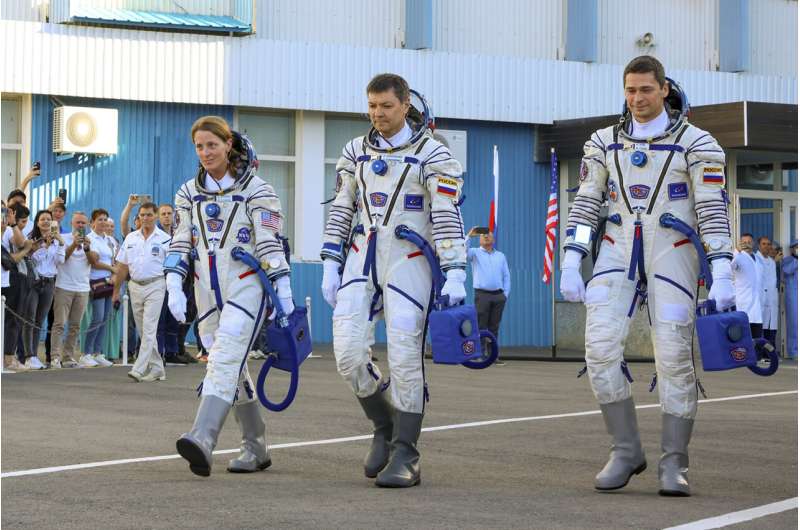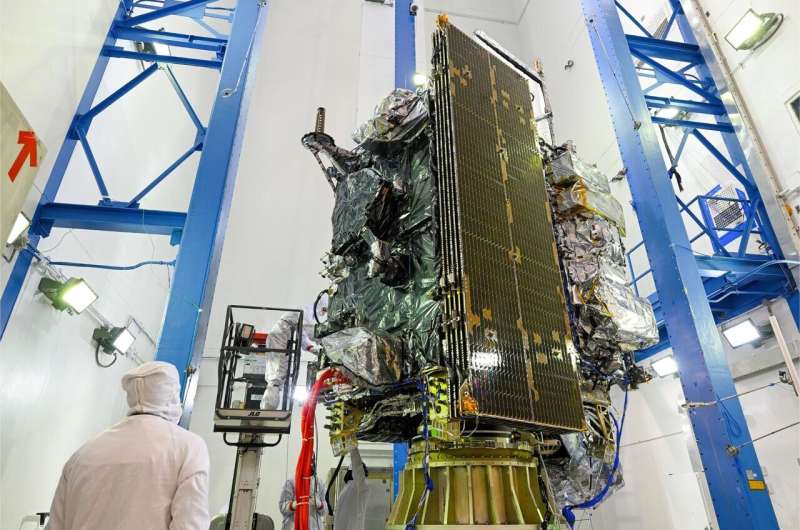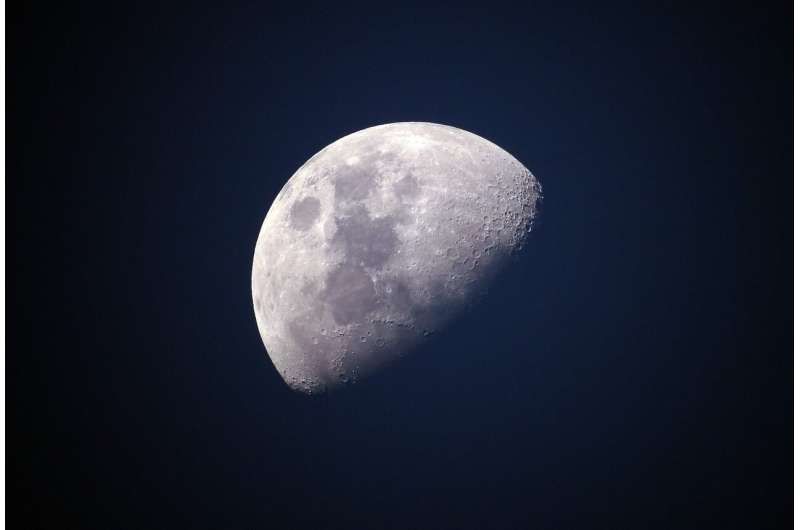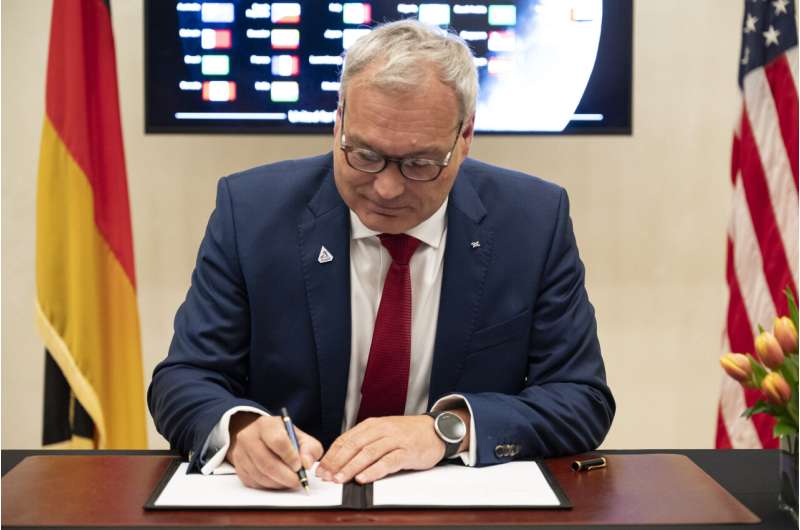One American, two Russians blast off in Russian capsule to International Space Station
Friday, 15 September 2023 17:17
One American and two Russians blasted off Friday aboard a Russian spacecraft on a quick trip to the International Space Station.
One American, two Russians ride Russian capsule to the International Space Station
Friday, 15 September 2023 17:17
One American and two Russians blasted off Friday aboard a Russian spacecraft on a quick trip to the International Space Station.
NOAA's GOES-U completes environmental testing
Friday, 15 September 2023 15:40
GOES-U, the fourth and final satellite in NOAA's GOES-R Series of advanced geostationary satellites, recently completed rigorous testing to ensure it can withstand the harsh conditions of launch and orbiting in space 22,236 miles above Earth.
The testing process spanned nearly a year. During thermal vacuum testing, completed in November 2022, GOES-U was placed in a large 29-foot wide by 65-foot deep (9 meter by 20 meter) chamber and subjected to a vast range of temperatures, soaring as high as 188 degrees Fahrenheit (87 degrees Celsius) and dropping as low as minus 67 degrees Fahrenheit (minus 55 degrees Celsius) to simulate the extreme temperatures of launch and the space environment.
In February 2023, GOES-U completed vibration testing, which mimics the stresses it will experience during launch to ensure the satellite doesn't have structural weaknesses.
Exploring the lunar south pole: Lessons from Chandrayaan-3
Friday, 15 September 2023 15:34
On August 23 the Indian Space Research Organisation (ISRO) successfully landed a spacecraft on the moon's south pole, a location that has always been of particular interest to scientists due to the unique conditions created by the planet's extremities.
The moon rover, Chandrayaan-3, which recently completed its 14-day mission, made history by landing on the lunar south pole. Dr. Laura McKemmish, an astrochemist from UNSW Sydney, explains the significance of the mission and what the future holds for lunar exploration.
"This is the first landing of India on the moon, and it will make India the fourth country ever to land on the moon," says Dr. McKemmish. "The ability of our global civilization to go into space exploration is really, really crucial to enable humankind as a global community to explore elsewhere in the universe."
Interest in the southern pole of the moon stems primarily from the fact that scientists have been aware of the presence of frozen water there, and locating water is a large part of Chandrayaan-3's mission. "Identifying frozen bodies of water on the moon is a really important gateway for further space discovery in our solar system.
Germany joins NASA's Artemis accords as newest signatory
Friday, 15 September 2023 14:23
During a ceremony at the German Ambassador's Residence in Washington on Thursday, Germany became the 29th country to sign the Artemis Accords.
Rocket Lab signs deal with Leidos to launch 4 HASTE missions
Friday, 15 September 2023 08:57 Rocket Lab USA, Inc. (Nasdaq: RKLB) has signed a contract with Leidos to launch four HASTE (Hypersonic Accelerator Suborbital Test Electron) missions.
The missions, scheduled across 2024 and 2025, will lift off from Rocket Lab Launch Complex 2 at Virginia's Mid-Atlantic Regional Spaceport within NASA's Wallops Flight Facility. Rocket Lab was selected by Leidos to provide hypersonic test la
Rocket Lab USA, Inc. (Nasdaq: RKLB) has signed a contract with Leidos to launch four HASTE (Hypersonic Accelerator Suborbital Test Electron) missions.
The missions, scheduled across 2024 and 2025, will lift off from Rocket Lab Launch Complex 2 at Virginia's Mid-Atlantic Regional Spaceport within NASA's Wallops Flight Facility. Rocket Lab was selected by Leidos to provide hypersonic test la Matter comprises of 31% of the total amount of matter and energy in the universe
Friday, 15 September 2023 08:57 "Cosmologists believe that only about 20% of the total matter is made of regular or 'baryonic' matter, which includes stars, galaxies, atoms, and life," explains first author Dr. Mohamed Abdullah, a researcher at the National Research Institute of Astronomy and Geophysics-Egypt, Chiba University, Japan. "About 80% is made of dark matter, whose mysterious nature is not yet known but may consist o
"Cosmologists believe that only about 20% of the total matter is made of regular or 'baryonic' matter, which includes stars, galaxies, atoms, and life," explains first author Dr. Mohamed Abdullah, a researcher at the National Research Institute of Astronomy and Geophysics-Egypt, Chiba University, Japan. "About 80% is made of dark matter, whose mysterious nature is not yet known but may consist o Webb confirms accuracy of Universe's expansion rate as measured by Hubble
Friday, 15 September 2023 08:57 The rate at which the universe is expanding, known as the Hubble constant, is one of the fundamental parameters for understanding the evolution and ultimate fate of the cosmos. However, a persistent difference called the "Hubble Tension" is seen between the value of the constant measured with a wide range of independent distance indicators and its value predicted from the big bang afterglow.
The rate at which the universe is expanding, known as the Hubble constant, is one of the fundamental parameters for understanding the evolution and ultimate fate of the cosmos. However, a persistent difference called the "Hubble Tension" is seen between the value of the constant measured with a wide range of independent distance indicators and its value predicted from the big bang afterglow. DISA and US Space Force award Iridium PLEO satellite-based services contract
Friday, 15 September 2023 08:57 Iridium Communications Inc. (NASDAQ: IRDM) has been awarded a five-year base Indefinite Delivery, Indefinite Quantity (IDIQ) contract with one five-year option by the U.S. Space Force for Iridium Certus services. The multiple awardee contract is part of a U.S. Proliferated Low Earth Orbit (PLEO) Satellite-Based Services award and includes multiple Iridium partners.
Unique in the satellite
Iridium Communications Inc. (NASDAQ: IRDM) has been awarded a five-year base Indefinite Delivery, Indefinite Quantity (IDIQ) contract with one five-year option by the U.S. Space Force for Iridium Certus services. The multiple awardee contract is part of a U.S. Proliferated Low Earth Orbit (PLEO) Satellite-Based Services award and includes multiple Iridium partners.
Unique in the satellite GMV tests robot for assembly and maintenance of structures in Earth orbit
Friday, 15 September 2023 08:57 Multinational technology company GMV has successfully concluded ground validation tests for a space robot designed to assemble structures in Earth's orbit as part of the European Space Agency's (ESA) MIRROR project (Multi-arm Installation Robot for Readying ORUS and Reflectors). These tests were conducted at GMV's facilities in Tres Cantos, Madrid, in the Platform-art robotic laboratory, where c
Multinational technology company GMV has successfully concluded ground validation tests for a space robot designed to assemble structures in Earth's orbit as part of the European Space Agency's (ESA) MIRROR project (Multi-arm Installation Robot for Readying ORUS and Reflectors). These tests were conducted at GMV's facilities in Tres Cantos, Madrid, in the Platform-art robotic laboratory, where c Sols 3948-3949: A Rocky Road, or Two!
Friday, 15 September 2023 08:57 Earth planning date: Wednesday, September 13, 2023: Our view out of the window, in this case the front hazard camera, is spectacular today, as you can see above. Regular readers of the mission updates will know that this rocky road has caused us problems in our driving lately, but today it all went smoothly. We are planning another 30 metre drive in today's plan, so let's hope Mars will read the
Earth planning date: Wednesday, September 13, 2023: Our view out of the window, in this case the front hazard camera, is spectacular today, as you can see above. Regular readers of the mission updates will know that this rocky road has caused us problems in our driving lately, but today it all went smoothly. We are planning another 30 metre drive in today's plan, so let's hope Mars will read the COSPAR new program seeks to build SmallSat capacity in Developing Countries
Friday, 15 September 2023 08:57 The Committee on Space Research (COSPAR) is pleased to announce the launch of a new Capacity Building program through collaboration in the field of small satellites (Small Sats). Institutes and universities in developing countries which are interested in developing small satellites by setting up or expanding a local laboratory are invited to join the project.
The program is expected to inc
The Committee on Space Research (COSPAR) is pleased to announce the launch of a new Capacity Building program through collaboration in the field of small satellites (Small Sats). Institutes and universities in developing countries which are interested in developing small satellites by setting up or expanding a local laboratory are invited to join the project.
The program is expected to inc Germany blocks full Chinese takeover of satellite startup
Friday, 15 September 2023 08:57 Germany has blocked a complete Chinese takeover of a satellite startup on national security grounds, sources close to the matter told AFP Thursday, as Berlin takes an increasingly hard line against Beijing.
Concerned at the heavy reliance of Europe's top economy on China, Chancellor Olaf Scholz's government has been pushing to "de-risk" and dial back dependencies.
The German tech company
Germany has blocked a complete Chinese takeover of a satellite startup on national security grounds, sources close to the matter told AFP Thursday, as Berlin takes an increasingly hard line against Beijing.
Concerned at the heavy reliance of Europe's top economy on China, Chancellor Olaf Scholz's government has been pushing to "de-risk" and dial back dependencies.
The German tech company 




